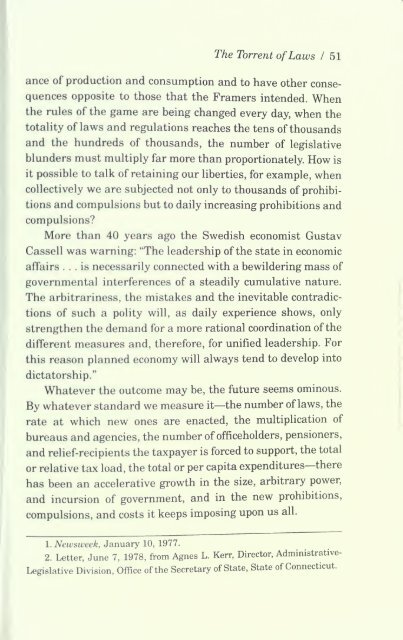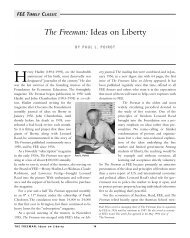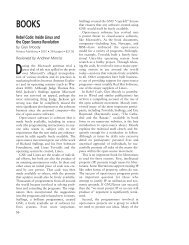Is Politics Insoluble?
Is Politics Insoluble?
Is Politics Insoluble?
You also want an ePaper? Increase the reach of your titles
YUMPU automatically turns print PDFs into web optimized ePapers that Google loves.
The Torrent ofLaws I 51<br />
ance of production and consumption and to have other consequences<br />
opposite to those that the Framers intended. When<br />
the rules of the game are being changed every day, when the<br />
totality of laws and regulations reaches the tens of thousands<br />
and the hundreds of thousands, the number of legislative<br />
blunders must multiply far more than proportionately. How is<br />
it possible to talk of retaining our liberties, for example, when<br />
collectively we are subjected not only to thousands of prohibi-<br />
tions and compulsions but to daily increasing prohibitions and<br />
compulsions?<br />
More than 40 years ago the Swedish economist Gustav<br />
Cassell was warning: "The leadership of the state in economic<br />
affairs ... is necessarily connected with a bewildering mass of<br />
governmental interferences of a steadily cumulative nature.<br />
The arbitrariness, the mistakes and the inevitable contradic-<br />
tions of such a polity will, as daily experience shows, only<br />
strengthen the demand for a more rational coordination of the<br />
different measures and, therefore, for unified leadership. For<br />
this reason planned economy will always tend to develop into<br />
dictatorship."<br />
Whatever the outcome may be, the future seems ominous.<br />
By whatever standard we measure it—the number of laws, the<br />
rate at which new ones are enacted, the multiplication of<br />
bureaus and agencies, the number of officeholders, pensioners,<br />
and relief-recipients the taxpayer is forced to support, the total<br />
or relative tax load, the total or per capita expenditures—there<br />
has been an accelerative growth in the size, arbitrary power,<br />
and incursion of government, and in the new prohibitions,<br />
compulsions, and costs it keeps imposing upon us all.<br />
1. Newsweek, January 10, 1977.<br />
2. Letter, June 7, 1978, from Agnes L. Kerr, Director, Administrative-<br />
Legislative Division, Office of the Secretary of State, State of Connecticut.








